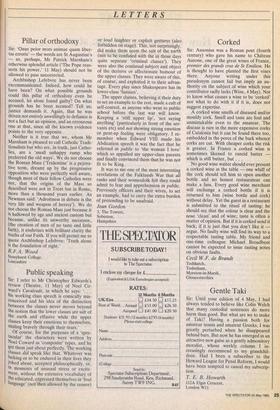Corked
Sir: Ausonius was a Roman poet (fourth century) who gave his name to Château Ausone, one of the great wines of France, premier des grands crus de St Emilion. He is thought to have planted the first vines there. Anyone writing under this pseudonym cannot fail but imply an au- thority on the subject of wine which your contributor sadly lacks (Wine, 4 May). Not to know what causes a wine to be `corked' nor what to do with it if it is, does not suggest expertise.
A corked wine smells of diseased and/or mouldy cork. Smell and taste are foul and unmistakable even to the amateur. The disease is rare in the more expensive corks of Catalonia but it can be found there too, embedded in the pores of the bark whence corks are cut. With cheaper corks the risk is greater. In France a corked wine is sometimes likened to rancid butter which is still butter, but . . .
No good wine waiter should ever present a corked wine at the table — one whiff of the cork should tell him to open another bottle and no honest restaurateur can make a fuss. Every good wine merchant will exchange a corked bottle if it is returned to him (wine bottle and cork) without delay. Yet the guest in a restaurant is submitted to the ritual of tasting: he should see that the colour is clear and the nose `clean' and of wine; taste is often a matter of opinion. But if it is corked send it back; if it is just that you don't like it argue. No faulty wine will find its way to a respectable tasting table. My friend and one-time colleague Michael Broadbent cannot be expected to issue tasting notes on obvious faults.
Cecil W.F. de Brandt
Todthatch, Todenham, Moreton-in-Marsh, Gloucestershire


















































 Previous page
Previous page